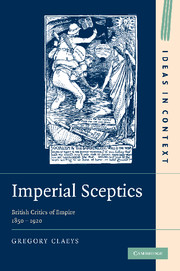Conclusion: the fruits of imperial scepticism:
more sovereignty and less
Published online by Cambridge University Press: 06 December 2010
Summary
Readers will draw their own deductions from any book, and these will not necessarily be those of even the most persuasive author. A study like the present, in any case, is not susceptible of a single conclusion, but rather points in several directions.
Our starting-point here was the broad presumption that the critical shift in British attitudes towards the empire has traditionally been identified with the Boer War, with Hobson's Imperialism marking the origins of the theoretically most incisive dissection of the sources and consequences of modern imperialism. The argument presented here has tried to alter this view of the growing antipathy to imperialism in Britain in the previous period in five ways. Firstly, we have seen that, rather than one, there were three definitive moments in the formation of a critical stance towards imperialism rooted in ethical considerations: the origins of Positivist analysis after 1855, peaking with James Geddes's pathbreaking account of Indian finance in the early 1870s; the invasion of Egypt in 1882, which first placed the ‘bondholder’ hypothesis before the wider public; and the Boer War, in which the influence of finance capitalists on imperial policy was presumed by its critics to be definitive. This chronology demonstrates that the genealogy of anti-imperialism was not only much more elongated, but also much more indebted to Positivism, than is usually acknowledged. The Positivist contribution to anti-imperialist writing from the mid-1850s until after 1920 was extraordinarily rich, far-reaching and diverse.
- Type
- Chapter
- Information
- Imperial ScepticsBritish Critics of Empire, 1850–1920, pp. 282 - 290Publisher: Cambridge University PressPrint publication year: 2010



